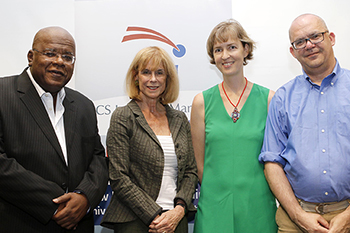Latest News Archive
Please select Category, Year, and then Month to display items
16 March 2021
|
Story Lacea Loader
![]()
All academic activities have been suspended on all UFS campuses from 17 to 22 March 2021. No online/face-to-face lectures/tests/assignments will take place until 23 March 2021, and the full academic programme will resume on this date.
This decision will allow the university management an opportunity to address outstanding matters regarding the admission of senior undergraduate students.
Administrative activities will continue during this time and the campuses are not closed. The university management is aware that sporadic disruptions of activities by small groups are still taking place on the Bloemfontein Campus.
Protection Services, with the assistance of private security, remains on high alert and is closely monitoring the situation on the campuses. The necessary safety and security plan, as well as contingency plans, are in place.
Please monitor the university’s communication platforms for updates on any developments.
It is important to ensure that your cellphone number is updated in order to receive communication via the KovsieApp and SMS.
Released by:
Lacea Loader (Director: Communication and Marketing)
Telephone: +27 51 401 2584 | +27 83 645 2454
Email: news@ufs.ac.za | loaderl@ufs.ac.za
Fax: +27 51 444 6393
UFS hosts first ACS Institute held on African soil
2015-12-08

The first ever Association for Cultural Studies (ACS) Institute hosted on the African continent is taking place on the Bloemfontein Campus. At the event are, from the left: Prof Jonathan Jansen, Vice-Chancellor and Rector of the UFS; Prof Jean Comaroff, Alfred North Whitehead Professor of African and African-American Studies and Anthropology at Harvard University; Prof Helene Strauss, Chair of the Department of English at the UFS; and Prof Gil Rodman, Chair of the Association for Cultural Studies and Professor of Communication Studies at the University of Minnesota.
Photo: Johan Roux
|
The University of the Free State (UFS) is hosting the 2015 conference of the Association for Cultural Studies (ACS) Institute – the first time for this international event to take place on the African continent.
From 7 – 12 December 2015, some of the world’s leading scholars in cultural studies are taking part in the conference on the Bloemfontein Campus. The event has been organised by the UFS Department of English in collaboration with colleagues from other departments in the Faculty of the Humanities.
The ACS is the foremost international association for scholars in cultural studies, and has been hosting the biennial Crossroads in Cultural Studies Conference since 2006. In 2011, the ACS held its inaugural institute at the University of Ghent (Belgium), followed, in 2013, by one at the Alpen-Adria University Klagenfurt (Austria). As the 2015 meeting of the institute is the first to be held in Africa, the organisers aim at highlighting the contributions that scholars from our continent and other (post)colonial contexts have made to cultural studies, even as it engaged many of the long-standing theoretical concerns generated for the field by scholars from the Global North.
Themed ‘Precarious Futures’, the conference explores how cultural studies might assist in charting more equitable futures by reflecting critically on the cultural, economic, and political trajectories within which precariousness – a state increasingly anticipated for the planet – might be altered. Experts in a diversity of disciplines are sharing their perspectives in the form of seminars and lectures.
Keynote lectures are delivered by Prof Jean Comaroff (Harvard University), Prof John Erni (Hong Kong Baptist University), Dr Jo Littler (City University London), Dr Zethu Matebeni (University of Cape Town), and Prof Handel Kashope Wright (University of British Columbia).
In her opening lecture on Monday 7 December 2015, Prof Comaroff addressed the challenging relationship of law, detection, and sovereignty in contemporary African polities within the South African post-apartheid context.
Topics discussed include climate change; the archives of everyday life; cross-racial intimacies; ethnography; meritocracy; cultural studies and human rights; China and globalisation; gender, sexuality, and race; and governance, embodiment and the work of care.